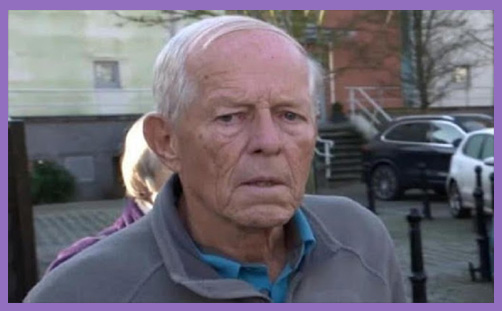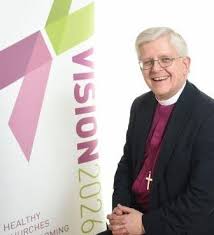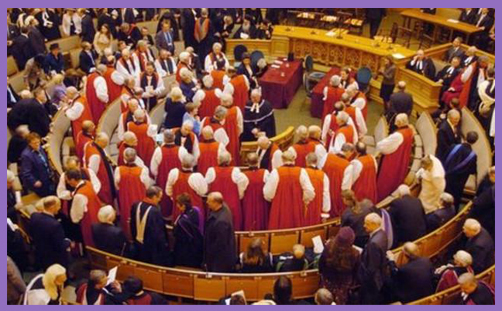
The question of who is and who is not a member of the Church of England/Anglican has always been difficult to determine. Church law has encouraged a fairly lax understanding of membership. Anyone who resides in a parish in England has an entitlement to vote for the churchwardens of their local parish church. Common-sense tells us that this ability in law to vote for the churchwardens at the Annual Parish meeting does not make someone a member of the Church of England. Nevertheless, the Church, being established by law, has always been hesitant to declare anyone who breathes as totally beyond its boundaries. Even those who do nothing and are not baptised seem to have certain rights and privileges within the body.
What is, in effect, a completely passive membership of the Church of England has for centuries been the norm for a large segment of the population. The only way that has been open to individuals to opt out of this membership was to declare openly that they belong to a dissenting group and then pointedly avoid attending the parish church. To be such an open ‘dissenter’ used to incur civil penalties, like exclusion from university. No doubt the authorities had other ways of discriminating against these non-conforming families. I am not enough of a historian to be able to list these penalties or know how they worked in practice. But, everyone else in society was deemed to be a ‘conformer’ and automatically Church of England. Regardless of how often or whether people attended church, everyone could enjoy a number of privileges, including the right to be married in church and be buried in the local churchyard. Actual attendance at church could be erratic, occasional or non-existent. Who knows how many fell below the Prayer Book minimum attendance rules of Easter communion and two other occasions?
The issue of who is and who is not an Anglican has become an topic of discussion recently with the case of John Smyth. Smyth, the notorious abuser and for a long time chair of the Iwerne trustees, spent the end of his life as a member of non-Anglican churches in South Africa. On the basis of this period of non-Anglican participation, the Archbishop of Canterbury has placed the ‘not-Anglican’ label on Smyth, apparently for the whole of his life. It is hard to make this claim when during his time living in Winchester, Smyth was a Reader at Christ Church Winchester. It seems fairly clear that, assuming this claim is correct, he would have had at some point to provide evidence of his Church of England baptism and confirmation before being admitted to Reader status. What happened after he left the UK in disgrace does not change his Church of England membership while he lived in this country, committing his crimes. I am reminded of the career of Michael Harper who resigned as a curate of All Soul’s Langham Place to promote the charismatic movement in the 60s. After retirement he then became a member of the Eastern Orthodox Church. Does the fact that Michael made such a radical switch from conservative Protestantism to Orthodoxy in any way invalidate his time at All Souls and his ministry there? No one would claim that he was Orthodox all the way through and that his evangelical Anglican past was in some way rendered invalid by a later change of allegiance. The evident Anglicanism of John Smyth is in no way changed by what he did at the end of his life. We suspect that, in any case, a change in denominational allegiance for Smyth would have been prompted by a desire to opt out of Anglican networks. It would have been easier for him to be spotted as an Anglican and thus prevented from exercising any kind of ministry.
The non-Anglican label has also been applied to the organisations that Smyth was associated with in England. The Iwerne Trust (now known as Titus Trustees) which runs the Christian summer camps from which all of Smyth’s victims came, was at the heart of a large informal network of well-connected and often wealthy Anglican Christians, most of whom live in the south of England. The same network exists today with a close association with the REFORM network. REFORM exists as pressure group within the Church of England, promoting a number of conservative Christian causes. It is active on General Synod promoting the anti-LGTB cause and supporting clergy and parishes that follow its conservative line.
The argument of the Archbishop and his advisers is to claim that the Church of England has no responsibility for Smyth and his victims because the Iwerne trustees were independent of the Church of England and not under its control. This is a patently absurd argument. Is the same argument to be applied to all the other independent organisations that work in and around the Church, including REFORM? The Iwerne trustees and the Titus group that followed it are stuffed full of ordained clergy who all hold licenses or PTOs from their bishops. A license to officiate involves an oath of obedience to the bishop ‘in all things lawful’. Does not the obedience promised ensure that every activity undertaken by an ordained priest is potentially subject to the scrutiny of a bishop? Just because the Titus Trust is not a legal entity controlled by the central Church does not stop individual ordained trustees being subject to episcopal authority. It is time for the Archbishop of Canterbury and his advisers to stop hiding behind the ‘not-Anglican’ argument and ask the ordained trustees who hid Smyth’s crimes for over thirty years to give an account of themselves. The Archbishop and the members of the House of Bishops do have real power in this situation. They can order an inquiry and require any clergy trustees with information about Smyth’s crimes to disclose them. The sanction of removing permissions to officiate or licences is available to enforce non-compliance. Those of us who have looked at Smyth’s crimes have been sickened at the detail. The accusation that there are clergy who in different ways are hiding these crimes by not sharing information is one that needs to be answered.
The reluctance of the Church of England at the highest level to take an active role in seeking resolution to the criminal activities of John Smyth is a running sore that will not go away. The motivations of the well-connected church people who provided the large sums of money necessary to spirit Smyth out of Britain to Africa also need to be explained. If the Church will not do it itself, then a ‘Smyth Inquiry’ should be handed over to an independent group. Once again, we have to point out that deflection and avoidance never serve the Church well. At the time when the public of Britain are beginning to conclude that the vested interests of church bodies take precedence to openness and integrity, we need bold actions by senior church figures. In this area courage is required. Such courage can be seen to be the mark of true leadership.








